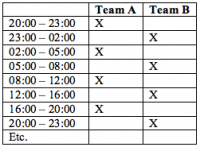before departure
a. Groceries
During preparations, it is agreed who buys which items and when. It is often practical to check with the person who was responsible for the stores in the previous race, what groceries are still on board. For costs, see III c.
Because of safety, we want to take as little glass on board as possible. For the less sturdy stomachs on board, often some crackers or other easily digestible substances are brought.
b. Preparing ship
The whole crew is responsible for the preparation of the ship. It is important that the ship is ready before the race starts. Remember the following items:
1. Drinking water (water tank and spare tank in the cockpit locker)
2. Diesel
3. Coordinating sailing wardrobe
4. Checking safety equipment
5. Any repairs / renewals
c. Navigation preparation
The Skipper or substitute skipper is responsible for the preparations of the navigation. For the area that is sailed conventional sea charts need to be on board and a nautical almanac. Besides, the Skipper or substitute skipper is responsible for the availability of tidal and weather information. The Skipper or substitute skipper writes the following matters in the log book;
1. Watch schedule
2. High and low water tables – with times
3. Overview of coast guard stations to be contacted
4. Overview of stores of fuel and drinking water on departure
5. If required, an overview with times of weather reports to be listened out.
d. Pre race meeting
Before every race – racing day – a pre race meeting is held. The aim is that every team member is at least informed about:
1. Time of departure
2. Starting time
3. Starting line
4. The course
5. The finish
6. Watch schedule
7. The latest weather forecast
8. Current details
9. The broad outline of the tactical plan
10. Safety equipment, which also includes how this equipment can be put to good use.
e. Watch arrangement
The watch arrangement is made by the Skipper. There will be two watches, Team A and Team B. Dependent on whether we sail with six, seven or eight, a watch includes three or four people. It is possible that one person (effectively Harry) will be placed outside the watch.
In every watch, a watch leader is appointed and when necessary a navigator. Furthermore, it is decided per watch who is the appointed helmsman. In principle, they steer the WINSOME during the race. Others steer the ship only after express consent by the Skipper.
f. Watch schedule
Unless arranged differently in the pre-race meeting, we work with the “ Swedish” watch system. In our opinion there are two important advantages. The night watches are relatively short (three hours). Since the number of watches per 24 hours is odd, a certain relay system occurs. Every day has different watches. Perhaps superfluously; the time used is UTC.
g. Watch rules
Changes of the watch take place according to some rules. Thus everybody will be on the same level and the ship kept as inhabitable as possible.
1. The coming watch is woken strictly on the hour of change-over, as stated in the above schedule. (So, not 10 or 15 minutes beforehand). We strive to have the departing watch in their bunks within 15 minutes).
2. The departing watch sees that hot water is available on the moment the watch changes.
3. The departing watch pumps out the bilge completely (on every change of watch). Preferably with the hand pump outside the cockpit on starboard.
4. The departing navigator sees to it that the elementary details are logged in the log book. Furthermore, the latest weather and navigational details are talked through with the new navigator. A plan is made for the forthcoming watch period.
5. If power must be charged, this is started upon waking the next watch.

